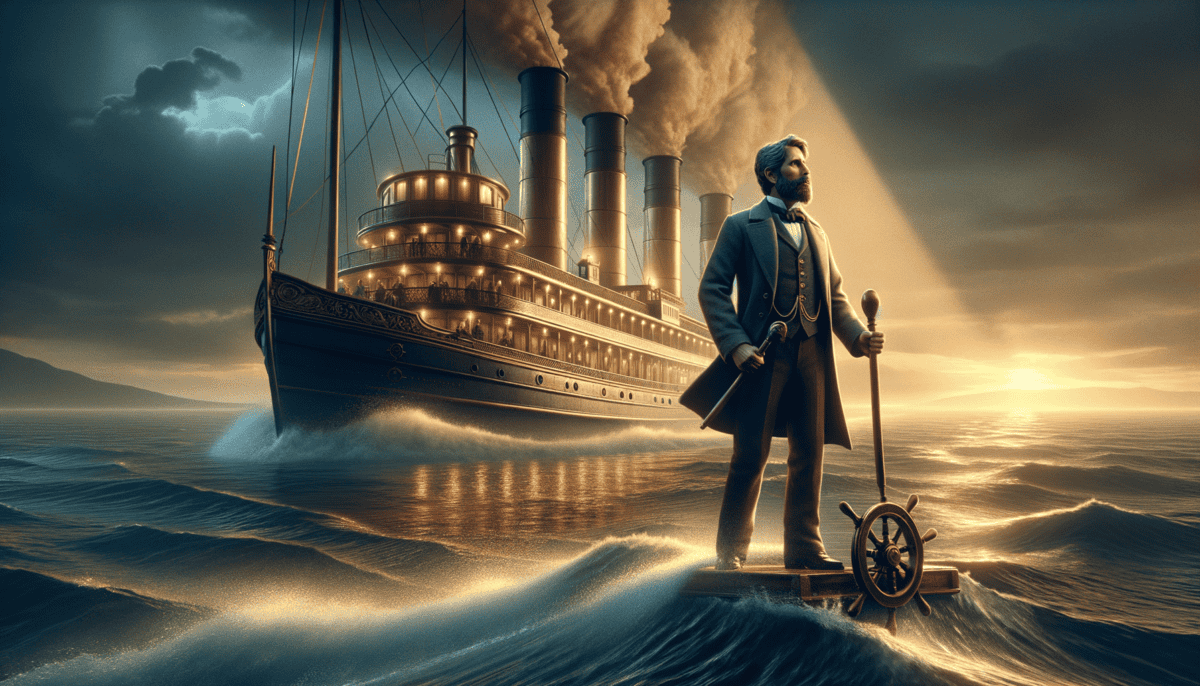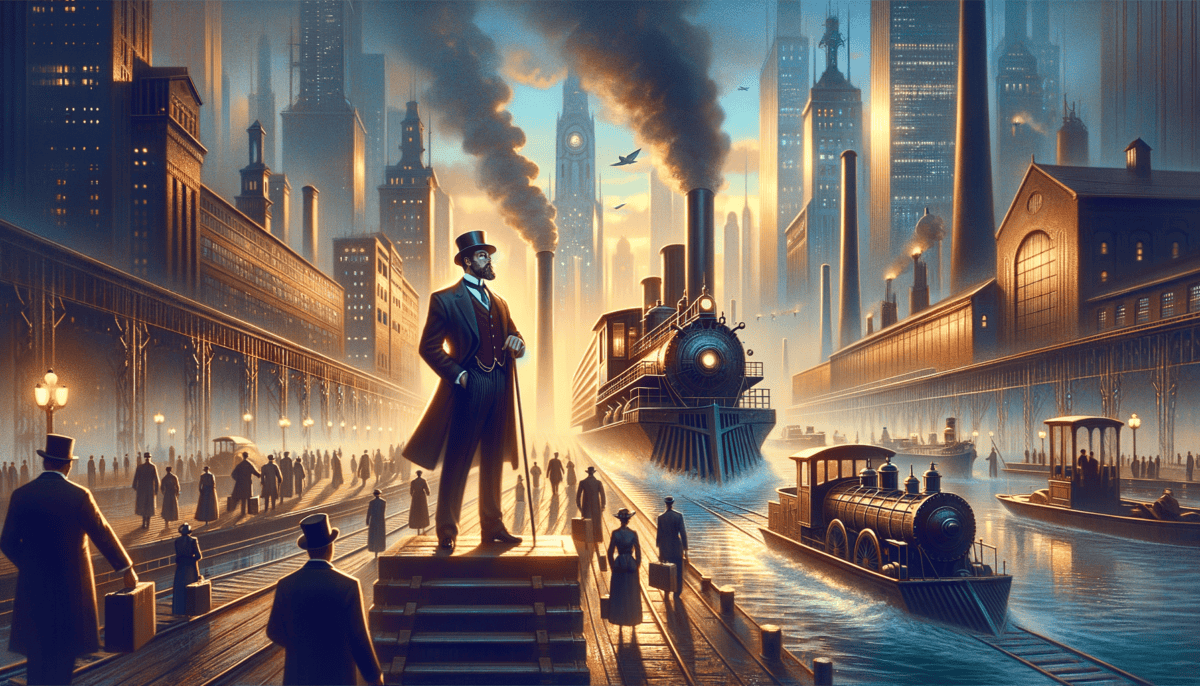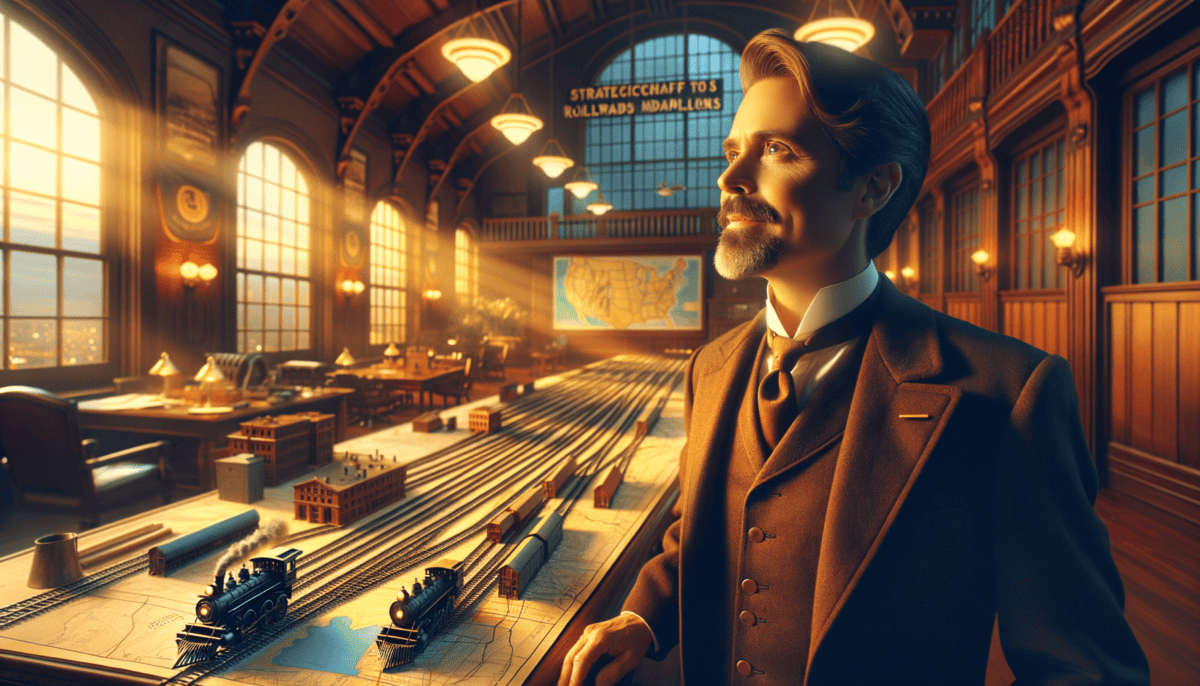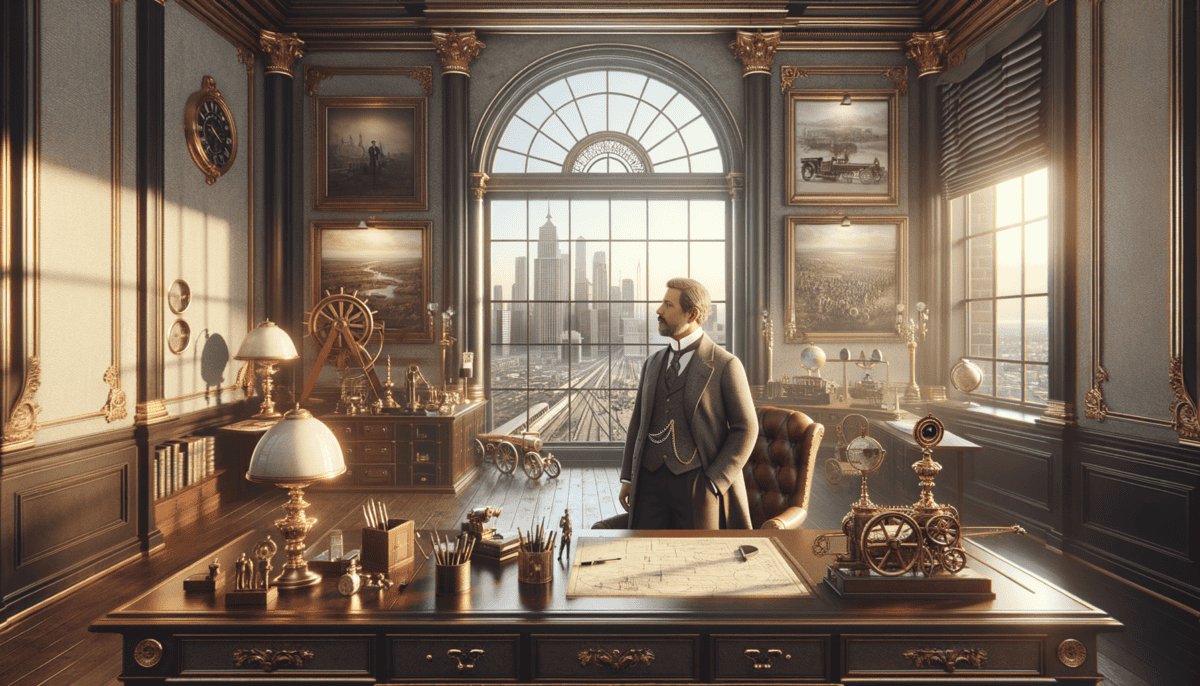Early Dreams in New York Harbor
The salty breeze whipped through young Cornelius Vanderbilt’s hair as he stood at the edge of Staten Island’s shore. It was 1810, and the busy New York Harbor stretched before him like a giant playground.
“Look at all those boats, Ma!” eleven-year-old Cornelius exclaimed. “One day, I’ll have my own boat too!”
His mother smiled but looked worried. The Vanderbilt family wasn’t rich. They were farmers, and life wasn’t easy. But young Cornelius had big dreams.
Every morning, Cornelius would wake up before the sun. He helped his father ferry people and goods across the water between Staten Island and Manhattan. The work was hard, but he loved being on the water.
A Boy with a Plan
“If you want to succeed, you need to work harder than everyone else,” his father always said. Young Cornelius took these words to heart.
He noticed something important: lots of people needed to cross the water every day. But there weren’t many good boats to help them. He saw an opportunity!
“I’m going to save every penny I earn,” Cornelius told his friend one day. “Soon I’ll buy my own boat!”
At age 16, Cornelius made his dream come true. He borrowed $100 from his mother and bought his first boat. It wasn’t very big or fancy, but it was his.
The First Big Step
Cornelius painted his boat bright colors to make it stand out. He kept it super clean and made sure to be on time, every time. People started calling him “that reliable ferry boy.”
Soon, he was making more money than he had ever seen before. But young Cornelius didn’t waste it on toys or candy. He saved almost everything he earned.
“Why don’t you buy yourself something nice?” his friends would ask.
“I’m saving for something bigger,” he would answer with a smile. “Just wait and see!”
Every night, Cornelius would count his money and plan his next move. He studied the other boats in the harbor. He watched how the successful captains ran their businesses. He was learning and growing.
Growing Success
By age 18, Cornelius had three boats! He hired other boys to help him run them. His little ferry business was becoming famous around New York Harbor.
Some of the older ferry operators didn’t like this young upstart. They tried to make things hard for him. But Cornelius was clever and worked even harder.
One day, as the sun set over New York Harbor, Cornelius stood on his favorite dock. He watched the bigger boats sailing past. His eyes sparkled with excitement.
“These ferries are just the beginning,” he said to himself. “One day, I’ll run the biggest ships in the world!”
Little did anyone know that this ambitious ferry boy would grow up to become one of the richest and most powerful businessmen in America. But that’s a story for another day…
The Steam-Powered Dream
The year was 1818, and Cornelius Vanderbilt stood on his ferry dock, watching something amazing. A strange boat was moving through the water – but it had no sails!
“It’s powered by steam!” someone shouted. Young Cornelius couldn’t take his eyes off it.
“This changes everything,” Cornelius whispered to himself. He knew right then that the future of boats would be different.
Learning New Things
Cornelius didn’t know much about steam engines. But he was determined to learn! He got a job working for Thomas Gibbons, who owned steamboats. ️
“Watch and learn, young man,” Thomas told him. “Steam is the future.”
Cornelius worked harder than ever. He learned everything he could about steam engines. He studied how the boats worked and how to run them safely.
“Knowledge is power,” Cornelius would say. “And I plan to know everything about steamboats!”
The Big Challenge
There was a big problem though. Some rich people had special rights to run steamboats. They didn’t want anyone else to have steamboats!
But Thomas Gibbons and Cornelius didn’t give up. They fought against these unfair rules. They wanted everyone to have a chance to use steam power.
The Commodore is Born
Cornelius got so good at running steamboats that people started calling him “The Commodore.” A commodore is like a captain, but even more important!
He started his own steamboat company. His boats were the fastest and cleanest. He charged fair prices, and people loved traveling on his ships.
“Remember when I just had one little ferry?” he would laugh. “Now look at these beautiful steamboats!”
Smart Business Moves
Cornelius was very clever with his business. When other boat owners tried to charge too much money, he would lower his prices. This made more people want to ride on his boats!
He also found new places to send his boats. While others stayed close to New York, Cornelius’s steamboats went to Boston, Philadelphia, and even far away places!
Growing Bigger
By 1829, Cornelius had the biggest steamboat company in America. He owned dozens of boats and made lots of money. But he never forgot his early days as a ferry boy.
“Success comes to those who work hard and think big,” he would tell his workers. He paid them well and expected them to do their best work.
People all over America knew about “Commodore” Vanderbilt and his amazing steamboats. But he wasn’t done yet – he had even bigger plans!
As he stood on the deck of his biggest steamboat, watching the sun set over New York Harbor, Cornelius smiled. That little ferry boy who dreamed big had become the king of the steamboats. And his story was still just beginning…
The Battle for Business Glory
The busy streets of New York in 1840 buzzed with excitement. Cornelius Vanderbilt stood tall on the deck of his finest steamboat. But he wasn’t smiling today.
“They want to fight? Then let’s give them a fight!” he declared, his voice strong and clear.
The Big Challenge
Other businessmen were trying to stop Vanderbilt. They didn’t like that his steamboats were the best. They tried to make deals to keep him out.
“Mr. Vanderbilt,” his helper said, “they’re offering you money to stay away.”
Cornelius laughed. “I don’t want their money. I want to give people fair prices and good service!”
The Clever Plan
Instead of giving up, Cornelius made his boats even better. He painted them bright colors. He made them faster. He even served good food on board!
“Give people more than they expect, and they’ll come back for more,” Cornelius always said.
His plan worked! More people chose Vanderbilt’s boats. They liked the low prices and good service.
Growing Bigger
Cornelius didn’t just stay in New York. He sent his boats to new places:
- Up to Boston in the north
- Down to Charleston in the south
- All the way to California during the Gold Rush! ⛰️
The Business Battle
Some rich businessmen tried to trick Cornelius. They made secret deals to hurt his business.
“They think they can stop me?” Cornelius said with a smile. “Watch this!”
He built newer, faster boats. He found better routes. When others charged high prices, he charged less. People loved him for it!
A Fair Fight
Cornelius believed in winning the right way. He didn’t trick people or tell lies. He just worked harder and smarter than everyone else.
“Mr. Vanderbilt,” asked a young worker, “why don’t you just buy their companies?”
“Because,” he answered, “it’s more fun to beat them fair and square!”
The People’s Champion
People started calling Cornelius “The People’s Champion.” He fought against greedy businessmen who wanted to charge too much money.
Workers liked him because he paid fair wages. Passengers liked him because his boats were the best. Even his rivals had to respect him!
“Success isn’t just about making money,” he would say. “It’s about doing things the right way.”
Looking Forward
By now, Cornelius was one of the most powerful businessmen in America. But he saw something new coming – railroads!
As he watched trains roll through New York, he thought about his next big move. The Commodore wasn’t done yet. He had new battles to fight and new victories to win!
Standing at his office window, watching his boats in the harbor, Cornelius smiled. He had beaten the biggest business giants in America. But the best part of his story was still to come…
Rails of Change
The year was 1862, and Cornelius Vanderbilt was watching a train chug through New York City. Steam puffed from its smokestack like giant clouds.
A New Direction
“The future is on those tracks,” Cornelius said to his son William. He knew boats were good, but trains could go where boats couldn’t!
William looked worried. “But Father, you know boats. Trains are different.”
Cornelius smiled. “Different is good. Different means opportunity!”
First Steps on Steel
Cornelius started by buying a small railroad called the Harlem Line. It wasn’t very good at first. The tracks were bumpy, and the trains were slow.
“If something’s worth doing, it’s worth doing right,” Cornelius declared.
He fixed the old tracks. He bought new trains. Soon, his railroad was the best in New York! ⭐
Making Trains Better
People were amazed at what Cornelius did:
- Made the trains run on time
- Kept the tickets cheap
- Made the ride smooth and safe ️
- Connected more cities together ️
Building the Big Railroad
Next, Cornelius bought the Hudson River Railroad. Then he got the New York Central. He connected them all together!
“Mr. Vanderbilt,” a reporter asked, “why do you want so many railroads?”
“To make travel better for everyone,” he answered. “And to make it faster!”
Smart Moves
Cornelius was clever with his railroads. He made them work together like a team. When other railroad owners tried to stop him, he found better ways to do things.
He built grand new stations. The biggest was Grand Central Depot in New York City. It was like a palace for trains!
Helping America Grow
The railroads did more than carry people. They carried food, wood, and other important things. Towns grew bigger where Vanderbilt’s trains stopped.
“Every rail we lay helps America grow stronger,” Cornelius would say proudly.
Teaching the Next Generation
As his railroad empire grew, Cornelius spent more time teaching his son William. He wanted the railroads to stay good even after he was gone.
“Remember, William,” he said, “these trains connect people. That’s more important than money.”
The Railroad King
By 1870, Cornelius was known as the Railroad King. His trains were everywhere! But he wasn’t finished yet.
Every morning, he would look at maps of his railroads. He would think about new places to build tracks. New ways to help people travel.
The old Commodore of the seas had become the master of the rails. But his greatest achievements were still ahead. Standing at his desk, looking at his empire of steel rails stretching across the land, Cornelius smiled. The journey wasn’t over…
The Empire Builder
By 1870, Cornelius Vanderbilt was the richest man in America! His railroad empire stretched far and wide, like a giant spider web made of steel.
A Man of Great Wealth
“What makes a person truly rich?” Cornelius asked his grandchildren one day. They sat in his big mansion on Staten Island.
“Money?” one guessed.
“No,” he smiled. “It’s what you do with it that matters.”
Giving Back
As Cornelius got older, he thought more about helping others. One day, he made a big decision.
“I want to build a school,” he told his family. “A place where anyone can learn, no matter if they’re rich or poor.”
“The best gift we can give is the gift of knowledge,” Cornelius declared.
That’s how Vanderbilt University began!
Family Matters
Cornelius spent more time with his family now. He taught them important things:
- Work hard every day
- Be honest in business
- Help others when you can
- Never stop learning
Running the Big Business
Even with all his success, Cornelius kept working. His son William helped him run the railroads. They made them better every day!
Making America Better
His railroads helped America grow strong. Towns became cities. Farms could send food everywhere. People could travel far and wide.
“Look at all the good we’ve done,” he told William. “These trains connect our whole country!”
Problems and Solutions
Running such a big business wasn’t always easy. Sometimes trains broke down. Sometimes people complained about prices.
“Every problem has a solution,” Cornelius would say. “We just have to find it!”
He worked hard to fix problems when they came up.
Building for Tomorrow
As he got older, Cornelius thought about the future more and more. He wanted his railroads to help people long after he was gone.
“William,” he said to his son, “remember that what we build today will help people tomorrow.”
A Growing Legacy
People everywhere knew about Cornelius Vanderbilt now. They called him the “Railroad King” and the “Great Commodore.”
But Cornelius cared more about what he built than what people called him. He looked at his railroads, his university, and his family with pride.
The little ferry boy from Staten Island had built something amazing. But there was still one more chapter in his story to tell…
A Lasting Legacy
The year was 1877. Cornelius Vanderbilt sat in his favorite chair by the window. He was 82 years old now, and he had quite a story to tell!
Looking Back
“Grandpa, tell us about your first ferry again!” his youngest grandchild begged. Cornelius smiled, remembering that small boat from so long ago.
“I started with just one tiny boat,” he said. “Now look what we’ve built!”
The Greatest Gift
Vanderbilt University was growing bigger and better. Students from all over came to learn there.
“Education lights up the world,” Cornelius told his family. “That school will help people long after I’m gone.”
He gave more money to make the university even better. It was his favorite project.
Teaching Important Lessons
William, his son, sat with him one evening. “Father, what’s the most important thing you’ve learned?”
Cornelius thought carefully. “Three things matter most:
- Work hard and be honest
- Help others when you can
- Never stop trying to make things better
Final Days
On January 4, 1877, Cornelius felt very tired. His family gathered around him.
“I’ve had a good life,” he told them. “I started with nothing but a dream. Look what dreams can do!” ⭐
America Remembers
When Cornelius died, all of America remembered him. Not just as the richest man, but as someone who helped make America better.
The trains kept running. Students kept learning. His family kept his good name.
“The Commodore showed us what one person can do when they never give up,” the newspapers wrote.
The Story Lives On
Today, we still see Cornelius Vanderbilt’s name. It’s on buildings, schools, and in history books.
But his real story isn’t about money or buildings. It’s about working hard, never giving up, and helping others.
His great-great-grandchildren still tell his story. And now you know it too!
Whenever you see a train or walk past a school, remember Cornelius Vanderbilt. Remember that your dreams can come true too – if you work hard and never give up!
The next time someone asks you who Cornelius Vanderbilt was, you can tell them: He was the ferry boy who built America’s railroads, started a great university, and showed us all what dreams can do! ⭐






